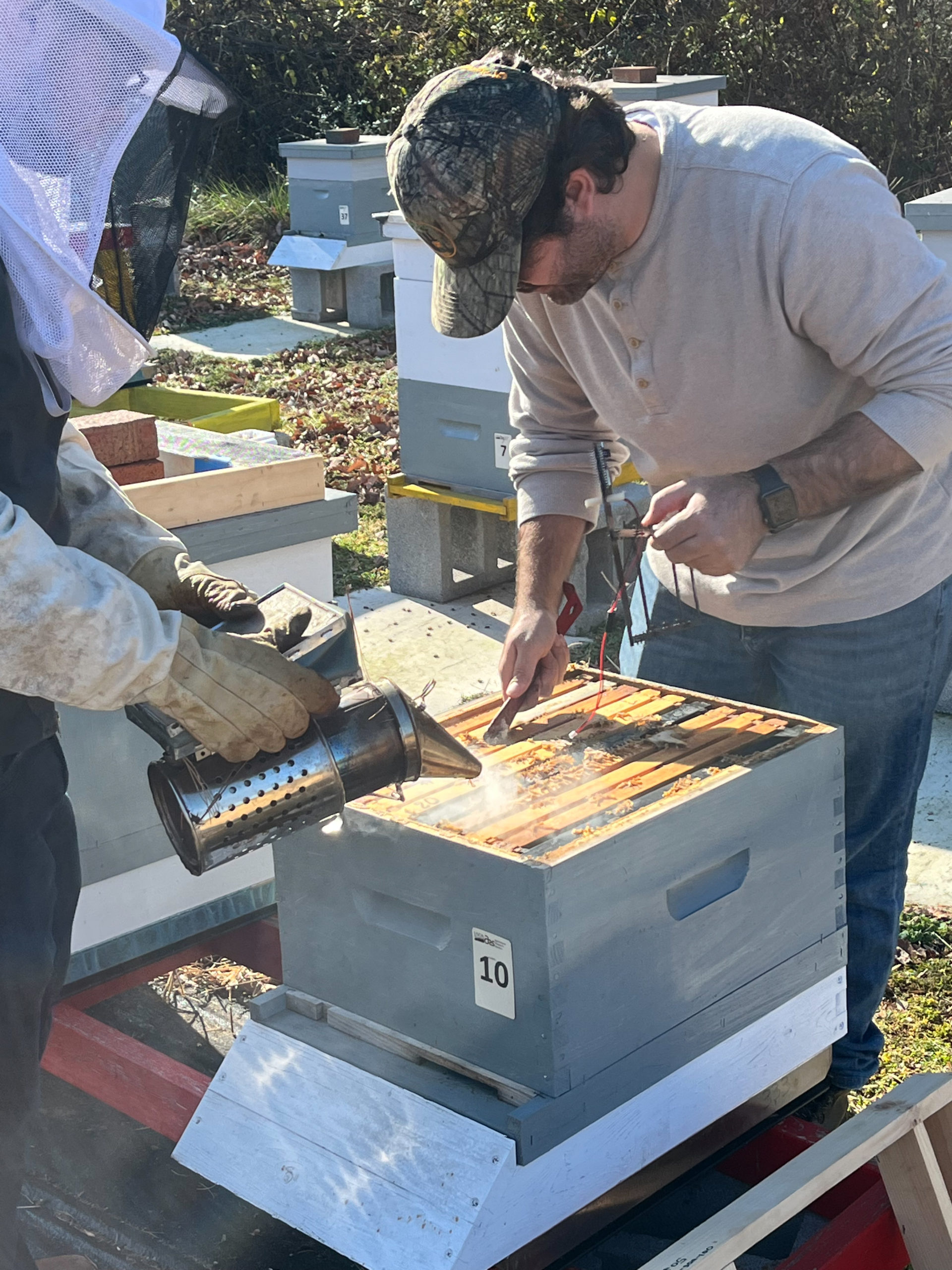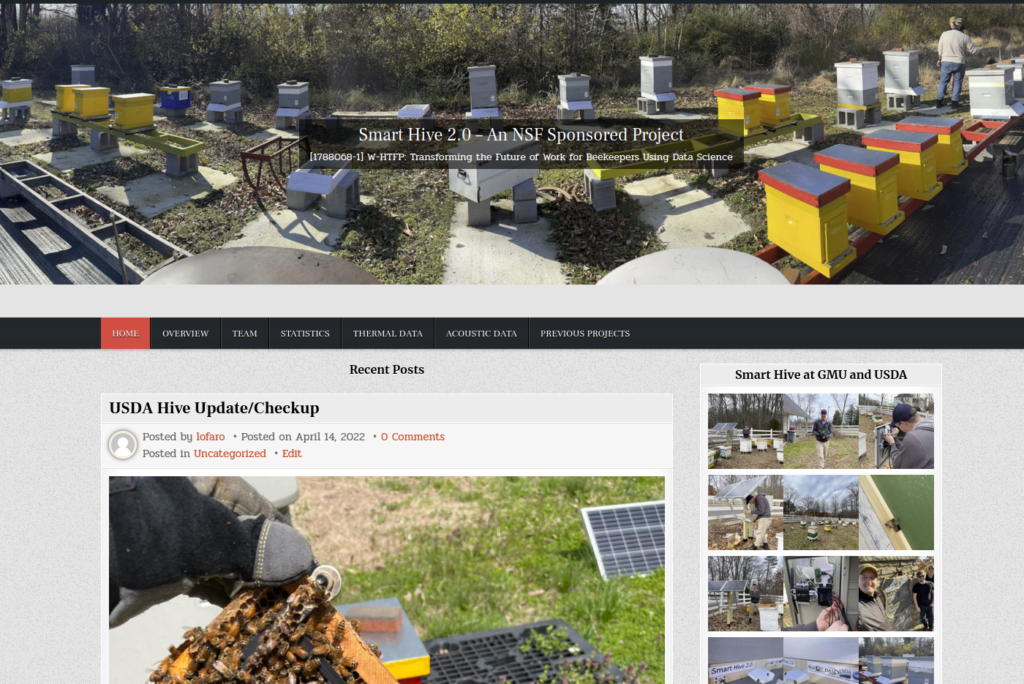The Smart Hive 2.0 has now gone live at the USDA and GMU.
Smart Hive 2.0 Home Page: https://www.smarthive.lofaro.net/
Overview:
The world faces an emerging and worsening crisis around pollinators (Aizen, 2009; Potts et al. 2010; UNEP, 2010; US Pollinator Report, 2015). Due to colony collapse disorder, invasive mites (varroa destructor), use of pesticides, and the rise of monoculture farming, honey bees are dying at unprecedented rates. The beekeeping workforce is facing a crisis. Traditional approaches to beekeeping have been unable to stem the tide of colony collapse. The results are devastating in terms of food security since bees pollinate one in every three bites of food that humans consume.
The decline in pollinators also threatens economic stability. U.S. honey production since 1987 has declined 78 million pounds (United States Department of Agriculture, 2019) and costs of crop pollination have increased dramatically. The future of work for beekeeping will involve mastering research-driven practices (Kulhanek et al, 2021) that respond to bee health in different landscapes (Patel et al., 2020), and that deploy sensors to monitor bee hive health and behavior (Catania & Vallone, 2020; Cecchi et al. 2020).
This project will involve a multidisciplinary approach to upskill and transform beekeeping, with special attention to the education pipeline, which is necessary to prepare students for transformed careers (Johannsen et al. 2021; Catania & Vallone, 2020). This project is a joint effort between the George Mason University (GMU) College of Education and Human Development (CEHD), the GMU School of Business (which houses the George Mason University Honey Bee Initiative), and experts on beekeeping and data science. Technically, the project will (a) deploy sensors in hives to generate data colony health as monitored by measurement, such as temperature, acoustic activity, weight, vibration, CO , humidity, and solar radiation; (b) and develop a cloud computing capacity to integrate the hive sensor data with field data (e.g., on phenology) to scientifically describe pollinator and ecosystem health
Team:
Principal Investigators, Senior Personnel, and Consultants:
Carley Fisher-Maltese (PI) is an assistant professor at GMU, who teaches math and science methods and policy courses in CEHD. Her research focuses on science learning and the link between learning in informal and formal settings.
Lisa Gring-Pemble (Co-PI) is an associate professor in the School of Business at George Mason University, and co-founder of the Honey Bee Initiative (HBI). She is Co-Executive Director for the Business for a Better World Center, a representative of Mason in the Champions Cycle of the Principles of Responsible Management (PRME) Initiative of the UN Global Compact, and Mason’s liaison to Ashoka
German Perilla (Co-PI) received his MA in Sustainable Development from GMU, 2012. He directs the HBI, teaches beekeeping classes in the College of Science, conducts bee research, and spearheads HBI global entrepreneurship outreach.
Daniel M. Lofaro (Consultant) is an assistant professor in the Department of Electrical and Computer Engineering at GMU. He is also director of the laboratory Lofaro Labs Robotics, which is a part of the international laboratory group called the DASL Autonomous Systems Lab Group. Additionally, he is an affiliate faculty at U.S. Naval Research Laboratory in the Navy Center for Applied Research in Artificial Intelligence within the Laboratory for Autonomous Systems Research (LASR).
Mohammed Alburaki (Consultant) is a research scientist at the USDA-ARS Bee Research Lab. He is an expert in bee toxicology and colony-level dynamics. He has outfitted his hives with sensors and can make available 300 monitored colonies for the project.
Ian Billick (Consultant) is the Executive Director of the Rocky Mountain Biological Laboratory. He is an ecologist. He has grown RMBL’s K-12 program, developing year-round programs that are integrated with the school systems. He is a former President of the Organization of Biological Field Stations, and chairs NSF’s Leadership Council for the Biology REU program.
Maria Bouga (Consultant) is a biologist at the Laboratory of Agricultural Zoology and Entomology in Athens, Greece. She is an EC member of the Coloss Honey Bee Research Association and senior editor at Journal of Apicultural Research IBRA UK.
Frank Linton (Consultant) received his Ed.D. in AI from the University of Massachusetts. He is an author, master beekeeper, and retired Artificial Intelligence Engineer from The MITRE Corporation.
Bonnie Miskovich is a middle school teacher. Her experience will prove useful in making information about bees, data science, and the beekeeping industry accessible to K-12 students
Jeff Pettis (Consultant) is a biologist and entomologist known for his work with honey bees. He is currently head of Apimondia, the International Federation of Beekeepers’ Association.
Sarah Red-Laird (Consultant) is the executive director of Bee Girl Organization, president of the Northwest Farmers Union, and Kids and Bees Director of the American Beekeeping
Federation.
Chris Scaptura is a K-12 STEAM Resource Teacher. His experience will prove useful in making information about bees, data science, and the beekeeping industry accessible to K-12
students.
Mary Ann Settlemeyer is an elementary school teacher. Her experience will prove useful in making information about bees and environmental science accessible to K-12 students.
Janice Years is a K-12 Computer Science Specialist. Her experience will prove useful in making information about computer and data science related to the sensors accessible to K-12
students.


